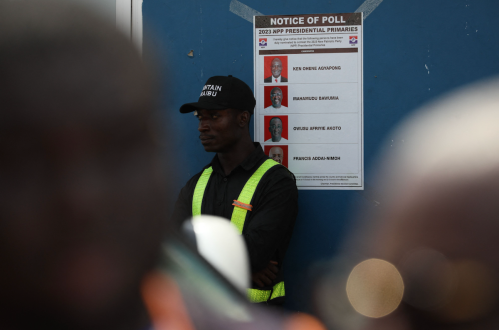President Joe Biden’s agenda is chock-full with many competing and challenging issues. Nevertheless, at the U.S.-Africa Leaders Summit last December, the president said that he would visit Africa in 2023. No details have been made public, but hopefully planning is well underway for what would be the first visit to the continent by a U.S. president since President Obama went to Kenya and Ethiopia in 2015. While the administration will inevitably have its own objectives for the visit, here we share ours and a recommended itinerary to encourage broader discussion about how to maximize the impact of what inevitably would be a very significant visit.
Nigeria and a new approach to the Sahel
The first stop should be Nigeria. The last American president to visit Africa’s most populous democracy was George W. Bush. That was 20 years ago.
Earlier this month, Biden met with Nigerian President Bola Tinubu on the sidelines of the G20 in New Delhi, India, to reinforce the U.S. commitment to Nigeria and Tinubu’s economic reforms. While in Nigeria, Biden should engage the president in his current capacity as chair of the Economic Community of West African States (ECOWAS), as the time is ripe to formulate a new approach to the Sahel region in consultation with leaders from ECOWAS and the African Union. The recent spate of military coups d’état across the region signals that the security-first approach to the Sahel, a principle that has guided U.S. policy for the last 30 years, is due for an urgent rethink. Launching a broad dialogue on climate, governance, economic growth, investments, transparency initiatives, and security would help to foster a new approach toward a region that has been neglected by U.S. policymakers for too long.
While in Nigeria, the president should meet with the region’s leading film, fashion, and music creators to understand the global impact of their artistry. Such a meeting could also lead to deeper industry ties between U.S. consumers and African creators.
Côte d’Ivoire and more resilient food systems
Biden’s second stop should be in neighboring Côte d’Ivoire, which no American president has visited before. There he could address the issue of food security, which was a major focus during the 2022 U.S.-Africa Leaders Summit. During the summit, the U.S. pledged to promote “transformational investments” in sustainable and resilient food systems. Côte d’Ivoire is a good place to follow up as the country is the world’s largest producer of cocoa and a major contributor to the global chocolate market that in 2022 generated more than $110 billion. According to the World Bank, Côte d’Ivoire receives only between 5-7% of this revenue. A Biden visit would be a perfect opportunity for the U.S. government to demonstrate how it is working with the American companies that have invested in Côte d’Ivoire’s cocoa sector to enable Ivorian farmers to reap greater benefits from the cocoa supply chain.
Namibia and critical minerals
From Côte d’Ivoire, the president should travel to Namibia, which would be another first for a U.S. president. Namibia has a rich supply of key critical minerals, including lithium, copper, cobalt, uranium, and rare earth metals. The country also enjoys a well-deserved record for promoting good governance and protecting human rights. During the visit, Biden should discuss the inclusion of Namibia and other African countries in the Minerals Security Partnership, as it would be a powerful signal of the region’s ability to contribute to U.S. energy security.
Zambia and electric vehicle battery value chains
After visiting Namibia, it would make sense to stop over in nearby Zambia. While Vice President Kamala Harris and Treasury Secretary Janet Yellen visited the country earlier this year, a first-time visit by a U.S. president would help to consolidate this relationship. Also at the U.S.-Africa Leaders Summit last December, the U.S. signed a memorandum of understanding (MOU) with Zambia and the Democratic Republic of Congo (DRC) to develop jointly a supply chain for electric vehicle batteries. At the G20 meeting earlier this month, the U.S. and European Union reaffirmed their commitment to strengthening the critical infrastructure between southern DRC, northwestern Zambia, and the Angolan port of Lobito. Biden’s visit would provide an opportunity to underscore the critical nature of these projects and highlight the progress that has been made since the MOU was signed 10 months ago.
Kenya: Trade and climate
The final stop should be Kenya, which is rapidly becoming Africa’s leading commercial hub and is among the United States’ largest trade partners in Africa. At least several issues should frame the commercial dialogue: finalizing the U.S.-Kenya Strategic Trade and Investment Partnership; modernizing the African Growth and Opportunity Act, which is set to expire in 2025; and utilizing these two trade initiatives to support the implementation of the African Continental Free Trade Agreement (AfCFTA).
In fact, at last year’s U.S.-Africa Leaders Summit, AfCFTA Secretary General Wamkele Mene and U.S. Trade Representative Katherine Tai signed an MOU that committed both sides to an annual high-level meeting to discuss cooperation on trade and investment between the U.S. and the continental free trade area. Biden’s visit would be a timely backdrop for the first of these meetings.
While in Kenya, Biden should also have a high-level dialogue with President William Ruto on how the U.S. can help him achieve the ambitious climate agenda that he unveiled at the inaugural Africa Climate Summit earlier this month. At the summit, Ruto challenged Kenya to increase renewable energy penetration from 92% to 100% for its power generation by 2030 and to construct a 100-gigawatt grid that is entirely renewable by 2040. Clearly, Kenya is at the forefront in Africa in transitioning to renewable energy sources, and the U.S. should explore what aspects of their success can be replicated—in Africa and globally.
During the trip, Biden should introduce the members of the President’s Advisory Council on African Diaspora Engagement that was announced at last December’s summit and awaits implementation. This would underscore the centrality of the diaspora to U.S.-African relations.
A trip of this scope would sustain the energy in the U.S. relationship with African nations that was generated at last year’s summit.
The Brookings Institution is committed to quality, independence, and impact.
We are supported by a diverse array of funders. In line with our values and policies, each Brookings publication represents the sole views of its author(s).









Commentary
Will Biden visit Africa this year?
September 22, 2023